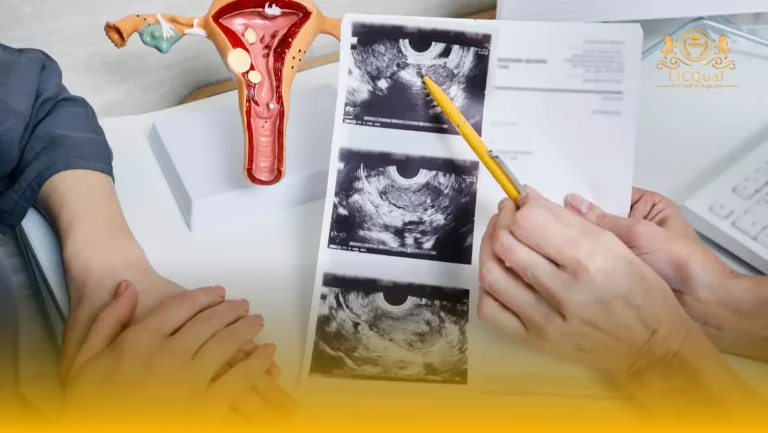The LICQual Level 6 Diploma in Clinical Pharmacy (D Clinical Pharmacy) is an advanced qualification designed for healthcare professionals who wish to enhance their clinical expertise, advance their career prospects, and strengthen their Continuing Professional Development (CPD). This diploma provides in-depth knowledge of clinical pharmacy practice, patient care, therapeutic management, and evidence-based decision-making within diverse healthcare settings.
Learners will gain expertise in areas such as advanced pharmacotherapy, clinical interventions, patient safety, medication review, and inter-professional collaboration. The programme equips learners with the ability to critically evaluate clinical data, optimize treatment outcomes, and contribute to the development of effective pharmacy services within hospitals, community pharmacies, and specialized healthcare institutions.
This qualification is specifically aimed at professionals seeking to expand their clinical knowledge, enhance patient care capabilities, and demonstrate a commitment to CPD. It supports learners in taking on leadership roles, conducting clinical audits, and implementing strategies that improve healthcare delivery and therapeutic outcomes.
Centres delivering the LICQual Level 6 Diploma in Clinical Pharmacy must ensure they have competent and qualified staff, along with access to high-quality teaching materials, clinical resources, and digital platforms. Providing a supportive learning environment with practical and theoretical guidance is essential to enable learners to achieve success and apply their learning effectively in real-world clinical practice.
The LICQual Level 6 Diploma in Clinical Pharmacy is an ideal pathway for learners who aspire to excel in clinical pharmacy, influence patient care positively, and contribute to the advancement of healthcare services through professional expertise and evidence-based practice.
Course Overview
Qualification Title
LICQual Level 6 Diploma in Clinical Pharmacy (D Clinical Pharmacy)
Total Units
6
Total Credits
120
GLH
480
Qualification #
LICQ2201190
Qualification Specification
To enroll in the LICQual Level 6 Diploma in Clinical Pharmacy (D Clinical Pharmacy), applicants must meet the following criteria:
|
Qualification# |
Unit Title |
Credits |
GLH |
|---|---|---|---|
|
LICQ2201190-1 |
Advanced Clinical Pharmacotherapy |
20 |
80 |
|
LICQ2201190-2 |
Clinical Assessment and Patient Care |
20 |
80 |
|
LICQ2201190-3 |
Medication Review and Optimization |
20 |
80 |
|
LICQ2201190-4 |
Clinical Decision-Making and Risk Management |
20 |
80 |
|
LICQ2201190-5 |
Inter-professional Collaboration and Healthcare Leadership |
20 |
80 |
|
LICQ2201190-6 |
Research, Evidence-Based Practice, and Professional Development |
20 |
80 |
By the end of this course, learners will be able to:
Unit 1: Advanced Clinical Pharmacotherapy
By the end of this unit, learners will be able to
- Analyse advanced pharmacological principles and drug mechanisms
- Evaluate therapeutic strategies for complex clinical conditions
- Apply evidence-based approaches to optimise patient treatment plans
- Critically assess new therapies and clinical guidelines in pharmacy practice
Unit 2: Clinical Assessment and Patient Care
By the end of this unit, learners will be able to
- Conduct comprehensive patient assessments including history and examination
- Develop personalised care plans based on clinical findings
- Apply clinical reasoning to prioritise patient needs and interventions
- Monitor and evaluate patient outcomes to inform ongoing care
Unit 3: Medication Review and Optimisation
By the end of this unit, learners will be able to
- Conduct thorough medication reviews to identify drug-related problems
- Recommend strategies to optimise therapy and improve patient safety
- Evaluate the effectiveness and appropriateness of current medication regimens
- Implement changes to therapy in collaboration with healthcare teams
Unit 4: Clinical Decision-Making and Risk Management
By the end of this unit, learners will be able to
- Apply clinical decision-making frameworks in complex patient scenarios
- Identify and assess risks associated with medications and treatments
- Develop strategies to mitigate clinical risks and improve safety
- Critically evaluate clinical outcomes to support informed decision-making
Unit 5: Inter-professional Collaboration and Healthcare Leadership
By the end of this unit, learners will be able to
- Demonstrate effective communication and collaboration with multidisciplinary teams
- Apply leadership skills in clinical pharmacy settings
- Promote teamwork to enhance patient care and service delivery
- Evaluate the impact of inter-professional practice on healthcare outcomes
Unit 6: Research, Evidence-Based Practice, and Professional Development
By the end of this unit, learners will be able to
- Design and conduct small-scale research projects relevant to clinical pharmacy
- Apply evidence-based practice to clinical decision-making and patient care
- Critically analyse and report research findings in a professional format
- Plan and engage in Continuing Professional Development (CPD) to maintain clinical expertise
The LICQual Level 6 Diploma in Clinical Pharmacy (D Clinical Pharmacy) is designed for professionals and students who want to advance their expertise in clinical pharmacy, patient care, and evidence‑based practice. This internationally accredited qualification is ideal for pharmacists, healthcare managers, researchers, and academic trainers who aim to strengthen their leadership in clinical pharmacy. With flexible online study and global recognition, it is perfect for anyone seeking career advancement, credibility, and practical skills in clinical pharmacy and healthcare systems.
1. Practicing Pharmacists
- Gain advanced knowledge of clinical pharmacy and therapeutic drug monitoring
- Strengthen compliance with international healthcare standards and patient safety protocols
- Enhance credibility with an internationally recognized qualification
- Prepare for leadership roles in hospitals, clinics, and healthcare organizations
- Stay updated with evolving clinical pharmacy practices and global healthcare policies
2. Pharmacy Students and Graduates
- Build a strong foundation in clinical pharmacy before entering the workforce
- Improve employability with a Level 6 diploma UK recognized
- Learn practical applications of pharmacotherapy and evidence‑based prescribing
- Gain confidence in applying clinical pharmacy principles in real‑world settings
- Add a career‑ready certification to your academic portfolio
3. Healthcare Professionals
- Understand clinical pharmacy across diverse healthcare systems
- Strengthen skills in patient safety, drug utilization, and therapeutic monitoring
- Expand career opportunities with international accreditation
- Apply clinical pharmacy principles in multidisciplinary healthcare teams
- Improve patient trust through safe and effective medicine delivery
4. Healthcare Managers and Administrators
- Deepen expertise in clinical pharmacy and healthcare systems management
- Strengthen oversight of ethical and professional healthcare practices
- Gain practical tools for monitoring and evaluating healthcare performance
- Improve career advancement opportunities in healthcare administration
- Enhance credibility with a specialized diploma in clinical pharmacy
5. Pharmaceutical Researchers
- Deepen expertise in clinical trials, drug development, and therapeutic evaluation
- Strengthen research credibility with accredited certification
- Gain practical tools for designing and evaluating pharmaceutical studies
- Improve career advancement opportunities in pharmaceutical R&D
- Enhance knowledge of evidence‑based medicine and healthcare informatics
6. International Candidates
- Earn a globally recognized clinical pharmacy qualification
- Access flexible online study from anywhere in the world
- Meet international accreditation standards for healthcare practice
- Strengthen career prospects in diverse healthcare and pharmaceutical markets
- Gain cross‑border knowledge of clinical pharmacy and healthcare systems
7. Academic and Training Professionals
- Use the diploma to enrich teaching and training programs
- Gain structured knowledge of clinical pharmacy for curriculum design
- Strengthen EEAT compliance in educational content delivery
- Provide students with internationally accredited learning pathways
- Enhance professional standing in academic and healthcare education
Centres delivering the LICQual Level 6 Diploma in Clinical Pharmacy must meet specific standards to ensure high-quality training and learner success. These requirements ensure learners gain advanced clinical knowledge, practical skills, and professional competencies.
- Qualified and experienced staff – Centres must employ trainers and assessors with relevant academic qualifications and professional experience in clinical pharmacy, healthcare, or pharmacy leadership.
- Access to learning resources – Learners should have access to up-to-date clinical guidelines, study materials, research databases, case studies, and digital learning platforms.
- Facilities and technology – Centres should provide adequate classrooms, online learning systems, and access to clinical tools to support practical and theoretical learning.
- Robust quality assurance systems – Internal quality assurance procedures must be in place to ensure fair, accurate, and consistent learner assessment.
- Compliance with international standards – Centres must deliver the qualification in line with global education benchmarks and pharmacy practice guidelines.
- Learner support and guidance – Academic support, mentoring, and career guidance should be provided to help learners succeed and apply learning in real-world clinical contexts.
- Commitment to CPD – Centres must encourage learners and staff to engage in Continuing Professional Development (CPD) to maintain industry-relevant knowledge and skills.
- Inclusive and safe learning environment – Centres should foster equality, diversity, and a supportive atmosphere to ensure all learners can participate fully.
Assessment and Verification
All units within this qualification are subject to internal assessment by the approved centre and external verification by LICQual. The qualification follows a criterion-referenced assessment approach, ensuring that learners meet all specified learning outcomes.
To achieve a ‘Pass’ in any unit, learners must provide valid, sufficient, and authentic evidence demonstrating their attainment of all learning outcomes and compliance with the prescribed assessment criteria. The Assessor is responsible for evaluating the evidence and determining whether the learner has successfully met the required standards.
Assessors must maintain a clear and comprehensive audit trail, documenting the basis for their assessment decisions to ensure transparency, consistency, and compliance with quality assurance requirements.







